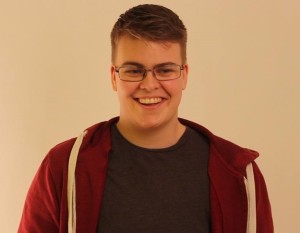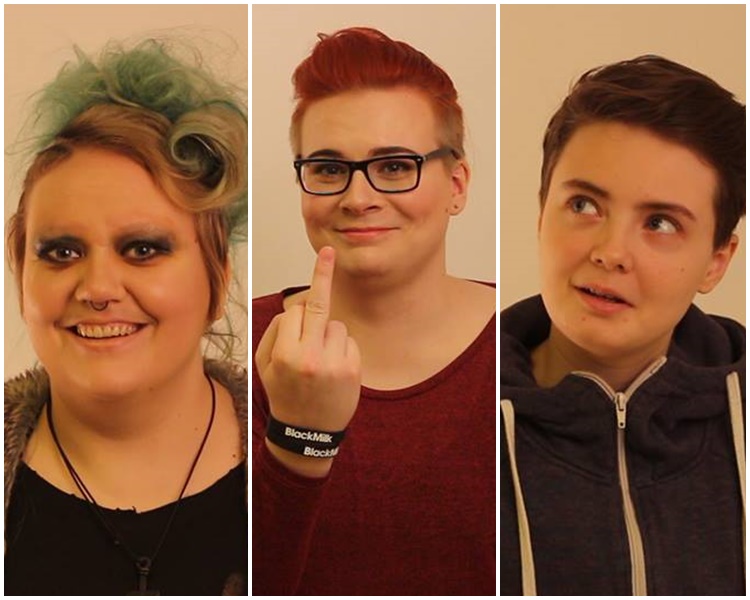Trans-Iceland has made a video, in cooperation with the anonymous curious public, where trans people answer questions which they usually hate being asked.
Alexander Björn Gunnarsson is one of the individuals appearing in the video, and as if he hadn’t had enough of questions already, he agreed to answer some more from us on GayIceland.

“We’re basically imitating a British version where inappropriate questions are addressed and answered,” says Alexander, when asked why Trans-Iceland decided to make the video. “We wanted to give the Icelandic public a chance to ask those questions – which we hate – and have them answered, for once and for all. The point is: There’s a time and a place for everything. We don’t like getting those questions from random people in the streets.”
In the video you actually answer those inappropriate questions?
“Yes. We made an anonymous online platform for people to post questions to, and then we used those questions in the video. So we basically got a lot of help from random, curious people, asking questions like: “What sort of sex do you have?” or “Does the operation hurt?” Everyone seems to assume that there’s just this one operation that all trans individuals go through. And questions about sex… I mean, if we’re not planning on having sex, it’s none of your business.”
So it’s basically a wide scale of questions related to physical technicalities and psychological issues, as well?
“Yes.”
Could you give us an example of that sort of questions?
“How did you tell your parents? What kind of prejudice do you meet on daily basis?”
“I get annoyed when people ask questions like: “Are you undergoing the operation?” or “When will the operation take place?”
Do you feel that all the questions you received are inappropriate?
“Most of them were, yes, rather inappropriate. Well, at least not questions you ask strangers in the grocery store.
Don’t get me wrong, we don’t want to discourage people to be curious and ask questions, but I guess what we’re trying to say is that there’s a time and a place for everything.”
Have the people in the video all experienced this; being questioned inappropriately from strangers regarding their gender?
“Yes, I think we have all been through that. People seem to feel that they have a right to know whatever about your personal life as a trans person.
For example Ugla, who is a bit known in the society, she probably has heard all those questions from random strangers.”

People assume that she’s a professional on trans issues?
“Exactly.”
What annoys you the most?
“I guess what mostly gets on my nerves is that people constantly refer to some standard procedure that supposedly applies to all trans individuals, a procedure which ends with “The Operartion”.
I get annoyed when people ask questions like: “Are you undergoing the operation?” or “When will the operation take place?”
Not everyone chooses to undergo an operation. Each procedure is personal.”
Do you feel that society still has a lot of misunderstanding in regards to trans issues?
“Yes. Especially when it comes to phrasing and word usage. Words can really hurt. For example when journalists write articles with outdated vocabulary, it can be hurtful.”
Do you feel that it should be the journalists’ responsibility to seek out the politically correct words before publishing an article?
“No, I guess that’s a demand we can’t make. Journalists don’t work as CIVIL RIGHT FIGHTERS , so we can’t request for them to dig deep into every issue and always know the right words to use.
But at the same time it is annoying having to contact the same medium over and over again to point out badly phrased articles – I feel that it should find its way eventually.”
Do you find it strange that the public is not better educated in trans-issues?
“Not really. The movement is quite younger than the gay rights movement, so it’s not strange that people are still getting used to the terms.”

Do you feel a difference in society since you came out as trans?
“I came out just over a year ago, and yes, I do. But perhaps that’s partly because I started paying attention to these matters. But since I mentioned the gay rights movements, I do think that the work there has cleared the path for other groups, such as trans-people, to follow and fight for their rights. People are definitely more open for new things.”
Where can people find information about transgender issues?
“We have a webpage, www.transisland.is, where we have a lot of information. We also have an educational group that can be hired for educational events. Samtökin ’78, the National Queer Association, can also provide information. And then, just, you know… Google is your friend.”
Do you think it’s important to make this video to reach out to people who would not seek information about transgender issues otherwise?
“Yes, definitely. We’re trying to subtly educate people who just want to laugh and have a good time.”
For more details on the program taking place in Reykjavík City Hall today in relation to the Transgender Day of Remembrance, click here.
Below: A sneak at the video. The full length version will be available soon.


